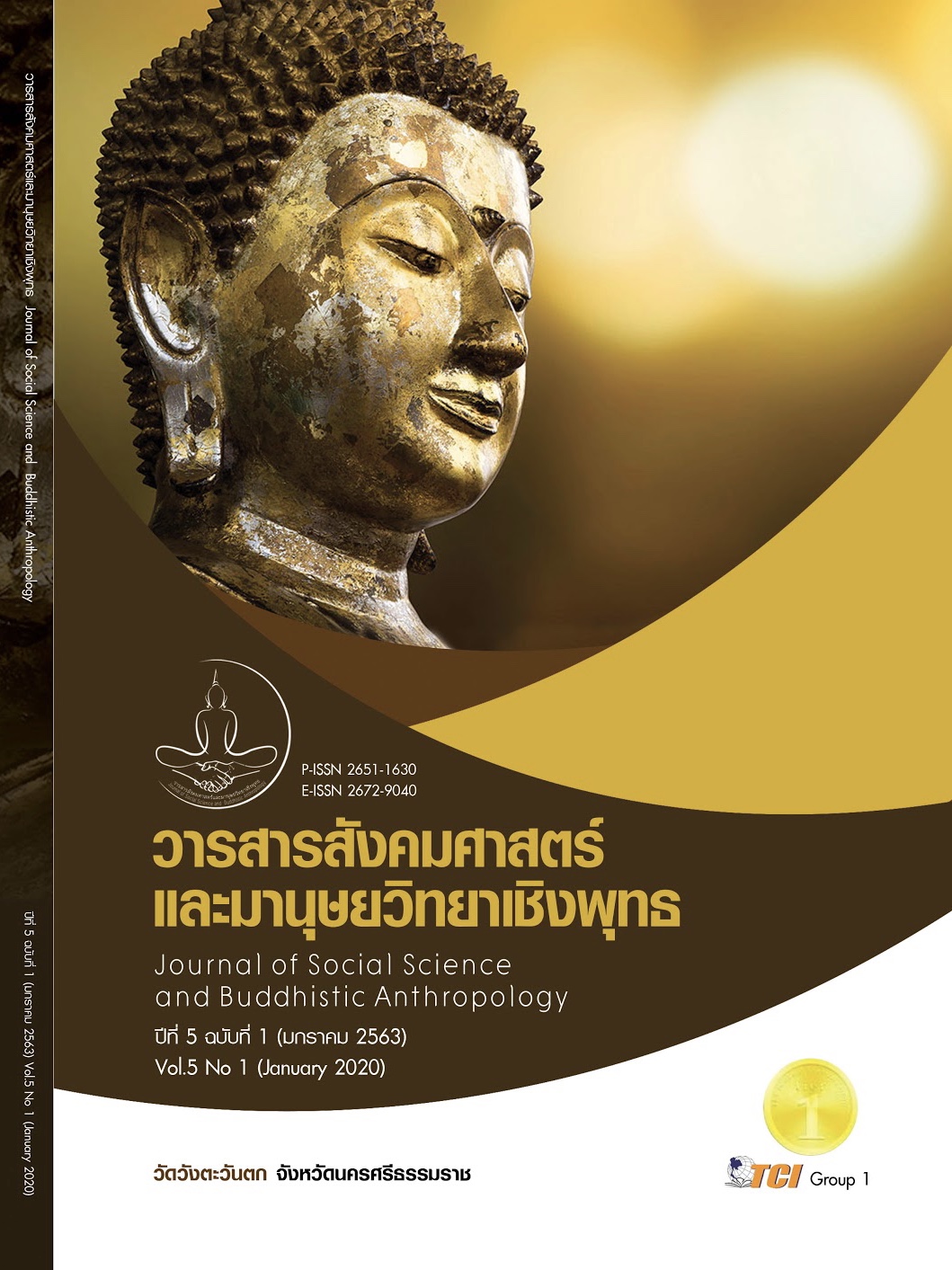A MODEL OF BUDDHIST PSYCHOLOGY FOR ENHANCING INTELLECTUAL HEALTH OF VOLUNTEER IN MEDITATION PRACTITIONERS
Keywords:
Buddhist Psychology, Enhancing Intellectual Health, Meditation PractitionersAbstract
The objectives of this article are 1) to study the state of intellectual health characteristics of volunteer mind as a good practice, 2) to study and analyze the process of enhancing intellectual wellbeing according to the Buddhist psychology of the volunteer mind, and 3) to propose a model for promoting intellectual well-being according to Buddhist psychology for volunteer mind in the practice group. Ethnographic Delphi Future Research (EDFR) was used for research design. There were 19 of key informants and experts consisted of Vipassana meditation, nuns, lecturer, Vipassana meditation instructor and volunteer spirit in the Dharma Practice Center. The research instruments were interview forms and questionnaires. Qualitative data was analyzed by using content analysis and analytic induction whereas quantitative data was analyzed by using descriptive statistics. Results of the research revealed that 1) the state of intellectual health characteristics of volunteer mind as a good practice which showed a lover of volunteer work and Dharma practice, be diligent and attentive to volunteer work. 2) The process of promoting the intellectual well-being according to the Buddhist psychology principles of the volunteer mind consisted of 4 steps: Step 1: love in volunteer spirit and Dharma practice, Step 2: persistently in the practice of volunteer spirit, Step 3: pay attention to the volunteer spirit and step 4: use wisdom to solve problems in the Dharma practice. 3) A model for promoting intellectual well-being according to Buddhist psychology for volunteer mind in the group of practitioners consisted of 5 components which were 3.1) the intellectual health of the volunteers, 3.2) the principles that help to improve the intellectual wellness, 3.3) the behavior Of volunteers with intellectual wellness, 3.4) factors that result in intellectual well-being, and 3.5) intellectual wellbeing and their own development. The scenario model is called the 3V Model.
References
กูล โพธิ์ทอง. (2560). กระบวนการตื่นรู้เพื่อพัฒนาจิตตนตามแนวพุทธจิตวิทยา. ใน ดุษฎีนิพนธ์พุทธศาสตรดุษฎีบัณฑิต สาขาพุทธจิตวิทยา. มหาวิทยาลัยมหาจุฬาลงกรณราชวิทยาลัย.
เครือข่ายพุทธิกา. (2560). โครงการ “สุขแท้ด้วยปัญญา ปี 3”. เรียกใช้เมื่อ 1 สิงหาคม 2560 จาก https://www.thaihealth.or.th/Content/20147
ณาตรการณ์ ชยุตสาหกิจ. (2557). การสนับสนุนจากครอบครัว ความหมายในชีวิตและสุขภาวะในเยาวชนผู้กระทำผิดที่ใช้สารเสพติด: การวิจัยแบบผสานวิธี. ใน วิทยานิพนธ์ศิลปศาสตรมหาบัณฑิต สาขาจิตวิทยา. จุฬาลงกรณ์มหาวิทยาลัย.
ประทีป พืชทองหลาง. (2556). รูปแบบการปรึกษาเชิงพุทธตามหลักกัลยาณมิตร. ใน ดุษฎีนิพนธ์พุทธศาสตรดุษฎีบัณฑิต สาขาวิชาพระพุทธศาสนา. มหาวิทยาลัยมหาจุฬาลงกรณราชวิทยาลัย.
ประพันธ์ ศุภษร และคณะ. (2555). กระบวนการพัฒนาจิตอาสาตามแนวพระพุทธศาสนา. ใน รายงานการวิจัยสถาบันวิจัยพุทธศาสตร์. มหาวิทยาลัยมหาจุฬาลงกรณราชวิทยาลัย.
ประสิทธิ์ ชาญศิริ. (2559). จิตพุทธอาสาเพื่อพัฒนาท้องถิ่น. วารสารศึกษาศาสตร์ ฉบับวิจัยบัณฑิตศึกษา มหาวิทยาลัยขอนแก่น, 10(4), 76-83.
พระพรหมคุณาภรณ์ (ป.อ.ปยุตโต). (2552). เครื่องวัดความเจริญของชาวพุทธ (อารยวัฑฒิ). กรุงเทพมหานคร: โรงพิมพ์ บริษัท สหธรรมิก จำกัด.
___________. (2559). พจนานุกรมพุทธศาสตร์ ฉบับประมวลธรรม. (พิมพ์ครั้งที่ 34). กรุงเทพมหานคร: มูลนิธิการศึกษาเพื่อสันติภาพ .
พระอภิรักษ์ กตฺติปญฺโญ (บุญเจียม). (2555). การศึกษาวิเคราะห์การบำเพ็ญบุญของอุบาสกในคัมภีร์พระพุทธศาสนาเถรวาท. ใน วิทยานิพนธ์พุทธศาสตรมหาบัณฑิต สาขาวิชาพระพุทธศาสนา. มหาวิทยาลัยมหาจุฬาลงกรณราชวิทยาลัย.
มหาจุฬาลงกรณราชวิทยาลัย. (2539). พระไตรปิฎกภาษาไทย ฉบับมหาจุฬาลงกรณราชวิทยาลัย. กรุงเทพมหานคร: โรงพิมพ์มหาจุฬาลงกรณ์ราชวิทยาลัย.
วิชุดา ฐิติโชติรัตนา. (2559). การพัฒนารูปแบบการปรึกษาแนวพุทธจิตวิทยาบูรณาการของพระสงฆ์ที่มีบทบาทให้การปรึกษา. ใน ดุษฎีนิพนธ์พุทธศาสตรดุษฎีบัณฑิต สาขาวิชาพุทธจิตวิทยา. มหาวิทยาลัยมหาจุฬาลงกรณราชวิทยาลัย.
เสาวนีย์ ฤดี. (2554). สุขภาวะองค์รวมแนวพุทธ: กรณีศึกษาผู้ป่วยโรคเบาหวานโรงพยาบาลราชวิถี. ใน วิทยานิพนธ์พุทธศาสตรมหาบัณฑิต สาขาวิชาพุทธศาสนา. มหาวิทยาลัยมหาจุฬาลงกรณราชวิทยาลัย.









